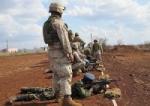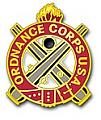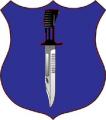Sure would, pity it never is.True in both cases, IMO.... On second thought though, my mind came back to our retaliatory tomahawk “raids” into the Sudan and Afghanistan in 1998. Did Al Qaeda get the “be nice or we’ll be back” message? Unfortunately, I think we sent just the opposite message: if you’re not nice we’ll launch an airstrike or two, maybe a few missiles, but otherwise leave you alone. And this only served to motivate Al Qaeda even further. If we left Afghanistan today, I’m afraid we’d pay an even greater price.That's true as well. I would submit that had we heeded the gospel according to Ken, 1998 as you appear to use the year, would not have occurred. Goes back to Carter's mishandling of Iran; Reagan's miserable failures in Lebanon, G.H.W. Bush's failure to drive on to Baghdad when it would have indeed been messy -- but almost certainly not as messy as this has been.I won't even address clinton's fly swats. All those things and four Presidents from both parties put us in Iraq in 2003.What else could we have done in 1998? Some might say altogether eliminate places where we believed Al Qaeda training grounds were on the map. This simply wasn’t an option in 1998, and unless Al Qaeda launches a WMD attack in the US or against one of our closest allies, I don’t think it will ever be an option.I doubt that would have been an option -- I certainly wouldn't advocate it, sounds terminally stupid, in fact. Bears and BB guns and all that. I've alrerady given my opinion on fly swats; so I thought did you -- they do more harm than good.So what other options did we have/do we have? Sending in the “stormtroops” from the 1stMarDiv or 82nd Airborne sounds great as well. Launch us into Afghan/Pakistan border, destroy a few villages alleged to support Bin Laden, Zawahiri, and Mullah Omar and then come home to a parade. Don’t have to worry about lengthy deployments, heavy logistics tails, none of this SASO or COIN stuff. Don’t have to debate is the proper term: IW, Complex IW, hybrid, small wars, SASO, Phase IV or Phase V, COIN, etc.Whose fault is that? Serious and I think an important question.In fact, this is what we were told in the initial days of OIF: after Baghdad falls, the President wants his “stormtroops” home. This certainly motivated all the Marines in the “march up.” As we all know now though, the so-called “stormtroops” were extended for 5 months, sent home for about 7, and have been back on the ground ever since.And I think you've just mixed then and now. As well as a potentially existential threat with a pestiferous threat. It was a different world then -- and vastly different capabilities are now available. Even more and better capabilites could be available if we had spent the money in better places than we have...Aside from reality differing from the “wreak destruction” and leave option, I think there’s a few other problems with this way of thinking as well. What’d we do after the Japanese attempted to wreak major destruction on us at Pearl Harbor? Did we succumb to their will? Again, just the opposite. And did the Japanese succumb to our will after losing island-after-island, enduring an intense firebombing campaign against Tokyo, the bombings at Hiroshima and Nagasaki, etc. I think in many ways Phase 4 and Phase 5 operations applied in Japan in 1945 just as they do in Iraq now.Yet another example of what applying half hearted measures will get you. War cannot be fought in the 'softly, softly' mode, to do so is simply to prolong the agony and cause more casualties for everyone. Polticians cannot seem to absorb that fact. Soldiers and Marines should be able to -- but they aren't in charge. Important point, that...With respect to Iraq, did Saddam ever succumb to our will after Desert Storm or later when we tried an airstrike/tomahawk heavy attack during Desert Fox? I’d argue he was a constant pain in the a__ and our containment strategy against Iraq throughout the 1990’s was quickly losing all effectiveness, if not worse.That's not what I said; I said no large scale COIN effort has done well. Contrary to what you seem to assert below, the Advisory effort in Viet Nam, hampered by all the things you mention, was really pretty successful. Can't say as much for the overall COIN effort there.With respect to no large US advisor mission has ever succeeded… have we ever really tried?This is likely to change in what way?We had many “advisors” in Vietnam but these advisors were faced with many of the same problems we have today: too often ad hoc, not always the “best and brightest,” inconsistent training, unity of command, mirror imaging, etc.That is my point -- we are not serious and we are highly unlikely to get serious about it so we'll be doomed to halfhearted measures.I think Ken makes a good point about it would take around 3 years to stand-up LtCol Nagl’s proposed Advisor Corps. Maybe. Depends on if we’re serious about the importance of the effort.Ain't America grand; 300M opinions looking for a home. That, too is unlikely to change no matter how much some wish.I made a similar argument on the Marine Corps side of the house in late 2005-2006. We’ve (USMC) made strides in the right direction, but I still don’t think we’ve found the answer. If we identified training and advising indigenous forces as the main efforts in Iraq and Afghanistan in 2005-2006, Ken’s 3 year mark would already be here or at least we’d be very close. So here we are in 2008, still arguing about priorities, deployment lengths, stretching the force, allegedly destroying our conventional warfighting capabilities, etc.The latter.Leaves me wondering again and again: do we really want to succeed or is preserving the force and the current status quo the priority.Me too -- but it's reality. Reality is a bore but it seems to be always with us.As we close on the 5-year anniversary of the fall of Baghdad, the thought of us still arguing about what to do in Phases 4-5 really troubles me.
Semper Fi,
Scott
BTW, I trust you also noted the fact that while I disagree with an Advisory Corps, I agree with John Nagl on the need for Advisory training; on the lack of flexible and adaptive thinking on the part of E-ring; and on the fact that we must be prepared to do COIN work. Trying to avoid it is smart IMO, but we have to be able to do it and do it better than we did this time. That's why I support the T-MAAG concept, far better COIN training than we're managing today and that both the Army and Marines HAVE to be full spectrum forces.
Unlike a lot of people, I believe that the services and the kids can do that full spectrum bit. Can the leadership adapt to it? That's another question...













 ?
?
 The Sunni insurgency seemed relatively decentralized and relied a lot on what I'll call "local initiatives" or "independent action." Do you think that the Lions of Iraq will be more effective at whatever level they have that compares to NCO? Will that have any influence on the Iraqi Army?
The Sunni insurgency seemed relatively decentralized and relied a lot on what I'll call "local initiatives" or "independent action." Do you think that the Lions of Iraq will be more effective at whatever level they have that compares to NCO? Will that have any influence on the Iraqi Army?


Bookmarks